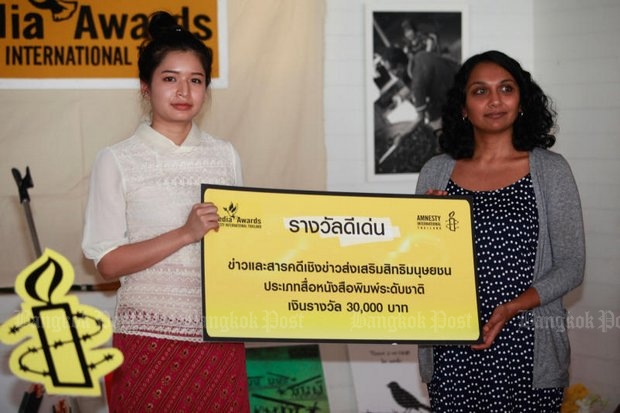
Journalists must refrain from self-censorship, despite the restrictions on media freedom imposed by the ruling junta, an activist-turned-media regulator said Thursday.
Supinya Klangnarong, a member of the state-run National Broadcasting and Telecommunications Commission, said the media was obliged to "dare to cross the line" on public interest issues, especially in a society with limited freedom of expression.
"State power is now the media's largest fear, and sometimes it causes them to back down," Ms Supinya said in a speech marking the Amnesty International Media For Human Rights Award ceremony.
- The winning story: Military mind games play out under strict insecurity
"A media that lacks freedom is not truly a media, but in fact a propaganda tool of the government," said the activist, who faced a criminal case and then a 400 million baht civil suit in 2004 for allegedly defaming Shin Corp, owned by then Prime Minister Thaksin Shinawatra.
Both cases were seen as important tests of Thailand's press freedom. She was taken to court by Shin Corp for "damaging the company's reputation and business dealings with research and articles that alleged links between it and the then ruling Thai Rak Thai Party". Both cases were dismissed in 2006.
The government has repeatedly denied restricting media freedom, although several journalists have been "summoned" by the regime for "attitude adjustment" sessions as their reports have been tracked by a committee set by the National Council for Peace and Order (NCPO).
Last December, Amnesty International urged its members worldwide to demand the NCPO lift the ban on public assembly and political activity, as well as drop all charges against student activists attempting to stage a symbolic graft investigation at the controversial Rajabhakti Park, one of the corruption issues dogging the military-led regime.
Foreign Minister Don Pramudwinai hit back this week, saying the London-based rights watchdog had sought to mislead the public into thinking the government was restricting human rights.
Champa Patel, Amnesty International's interim director for South Asia and South East Asia and Pacific, said the agency was "more than happy" to have a dialogue directly with the government, not via the media.

Supinya: Dare to cross the line